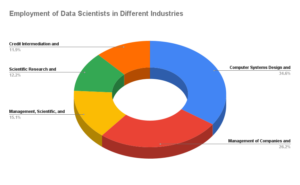Data Science has emerged as one of the most lucrative career fields in recent years globally. There is a high demand for skilled data scientists and analysts in the global business scenario.
Naturally, more and more people flock toward the field of data science in search of better career opportunities. However, many people have inadequate information about how to land a good data science job.
As per the data released by the Bureau of Labor Statistics, the Computer Systems Design industry employs the highest number of data scientists in the United States. According to the Bureau, the sector employs more than 16,000 data scientists in the country.
Despite a strong demand for data scientists around the world, some professionals struggle to get the desired job that fulfills their requirements.
This is often due to improper communication between the recruiters and candidates, while some professionals feel they deserve higher compensation and benefits. Moreover, due to vague job descriptions, some people find it challenging to choose the right data science position suitable for them.

Below we have mentioned some of the most common challenges faced by data scientists and other data science professionals while finding jobs.
How to Land a Good Data Science Job?
-
Challenge 1: High Entry Barriers
Even though data science is a trending topic these days and many people are pursuing a career in the field, not everyone is fully equipped to become a skilled data scientist. The internet is full of online courses that provide data science certifications that promise a strong career path. However, getting into the field of data science is not easy as it has high barriers to entry.
Data science combines three fields of study: business, mathematics, and computer science.
A candidate must have adequate knowledge in all of these fields to excel in the domain of data science. Understandably, not many people are experts in all three areas, which leads to skill mismatch and inadequacy.
In addition, many recruiters ask for a full-time Master’s degree for top-level data science jobs, which many applicants don’t have. These companies often look for several years of work experience along with a solid educational background.
Solution: Strive to Bolster Your Conceptual Knowledge
Candidates with a firm grasp of the most complicated data science topics will naturally have the upper hand over those who don’t. The best candidates have deep knowledge of the three related fields of study mentioned above, mathematics, computer science, and business. The ideal data scientist is tech savvy, great with numbers, and has strong business acumen.
This doesn’t necessarily mean that candidates with the highest levels of education are ideal. Instead, a person with modest education but comprehensive knowledge and clarity of complex subjects in the three areas will undoubtedly have a favorable career trajectory in data science.
According to the latest report by Burtch Works, roughly 49 % of data scientists come from Mathematics/Statistics and Engineering backgrounds. The same report also mentions that almost 50 % of data scientists have a Masters degree as their highest qualification, while 43 % have completed a Ph.D.
Looking at the data, it is evident that candidates with a Masters degree or a doctorate have a higher chance of landing a good data science job. Our recommendation is to build a strong educational foundation and supplement it by reading up on the latest developments in the field of data science. Meanwhile, youngsters who want to enter the field of data science should focus more on mathematics and statistics during their elementary education.
-
Challenge 2: Candidates Lacking Practical Knowledge and Skills
Practical knowledge is everything when it comes to data science; unfortunately, many potential candidates lack it. Many candidates focus on the theoretical aspects and concepts of data science and rarely pay attention to its practical aspects. Moreover, the field is constantly evolving as innovations happen almost every day. This leads to obsolete knowledge and experience on the candidates’ part.
Several data science professionals have doctoral degrees, suggesting they might have in-depth knowledge of the field. However, many of these data scientists focus entirely on the theoretical side and often overlook the practical applications of the area. Most recruiters look for domain expertise from their data science employees, who also thoroughly understand its practical aspects in the business world. Besides, the field of data science is constantly evolving and some candidates fail to keep up with the latest developments.
Solution: Focus On Practical Applications of Data Science and Build A Strong Portfolio
As mentioned above, many data science aspirants prioritize theoretical aspects of the field over practical ones, which eventually backfires. Companies and hiring managers are looking for highly adept individuals with adequate practical experience and knowledge. A data scientist should have a strong understanding of theoretical knowledge and be able to apply those concepts in a real business environment.
The best way to do this is by building a solid portfolio of high-quality projects. Candidates should focus on the value added by a project on their profile instead of doing multiple projects that don’t truly highlight their abilities. Completed projects are a way to show recruiters that a potential data scientist has a deep understanding of concepts and the innovative mindset to apply those concepts in a business environment. These projects should showcase an aspirant’s critical skills, competencies, and ability to work under pressure.
In addition to projects, data scientists must be willing to keep up with the latest developments in the field of data science as it is constantly evolving. A study by Kaggle mentioned that upto 90 % of data scientists maintain ongoing education by enrolling in courses to stay up to date with the latest developments.
While it is necessary to bolster your technical skills, data scientists must also have outstanding communication skills. A highly skilled individual with immense practical knowledge will often miss out on a good data science job because they could not convince the recruiter of their expertise. Candidates should also work on creating an attractive profile and resume that highlights their essential skills and relevant experience.
-
Challenge 3: Faulty Interview Process
The interview process is another major roadblock that hinders talented data scientists from getting desired jobs. If a recruiter has improper knowledge about their requirements and is confused about the role definitions, chances are the interview might be faulty. Moreover, there is no standardization of interviews across the industry, as firms have varying methodologies. All these factors lead to long, drawn-out interviews with multiple rounds where many companies delay the process due to poor recruitment practices.
In most cases, the interviewer doesn’t have the necessary knowledge about the role and the technical expertise needed for recruiting a data scientist. As a result, the interviewer often focuses on a candidate’s ability to use a particular tool rather than understanding data science concepts and logic. Subpar interviews can particularly harm those who have just begun their data science career and can be highly demotivating for them.
Solution: Maintain Regular Contact With Potential Recruiters
The fault here lies with the recruiters who take unreasonable amounts of time while recruiting data scientists. However, candidates can partly ameliorate this issue by regularly following up with their potential employers via email or any other means of communication. Moreover, candidates should highlight their ability to use specific tools in their resume to make it look more compelling for a recruiter.
On the other hand, companies should appoint hiring managers who have considerable knowledge of data science concepts and principles. Businesses can also include an expert data scientist in the interview panel to assist the hiring manager in the recruitment process. This will make it easier for the candidate and the company to find the right match.
Closing Words
Although data scientists are among the highest-paid and skilled professionals, it is not always possible to land a good data science job due to the factors mentioned above.
Potential data scientists can overcome these challenges by building a robust profile with a comprehensive portfolio of relevant projects highlighting their skills.
Moreover, candidates can increase their chances of landing a lucrative data science job by improving their communication skills and being up to date with the latest happenings in the industry.
To learn more about how to land a good data science job, get in touch with us at BenchPoint – a HealthTech recruitment agency with proven expertise in the niche. Our team will guide you through the process and help you get the data science job of your dreams.
